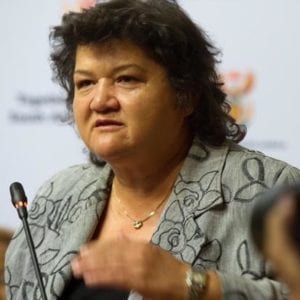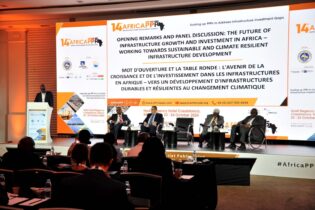
Minister of Public Enterprises Lynne Brown
Minster of Public Enterprises Lynne Brown recently noted these issues and delved deeper into the problems surrounding Eskom and Transet, maintaining that SOCs are not a drain on the economy.
According to Brown, the performance of SOCs is largely influenced by the performance of the domestic and global economies, which must be taken into account. The SOCs are also faced with challenges ranging from financial and operational sustainability to policy decisions that have an adverse impact on the viability of the SOC operations.
Brown provided an update on some of the acting appointments or vacancies of CEOs in SOCs:
- Denel CEO position is awaiting Cabinet process
- SAFCOL Board will undertake an open recruitment process
- Alexkor CEO and CFO recruitment has begun
- Eskom CEO recruitment process has also commenced
The minister said her department continues to strive to minimise vacancy rates at both board and executive levels.
Eskom
According to Brown the challenges facing Eskom are the uncertainty regarding the role of the company in the future build programme, the adverse impact of Independent Power Producers (IPP) programme on the potential impact on its balance sheet, and high environmental compliance costs.
In terms of IPPs, Brown noted that government is committed to the energy mix which includes coal, renewables, nuclear and gas. However, the risk of excess capacity is a concern.
However, IPPs were conceived when growth was forecast above 5%. But electricity demand growth has decreased and Eskom runs the risk of excess capacity. IPP contracts commit government to long term agreements, even if the power is not required, as is the case currently. “Currently we have 4 000 MW any at given day,” said Brown.
Excess capacity could lead to stranded assets which would result in rising costs of energy, which will affect long-term growth. “It is therefore critical that the country allows a revised plan that will better inform choices,” the minister stressed.
Furthermore, Eskom estimates a total of R340 billion will be required to fully meet environmental compliance obligations, placing significant upward pressure on the overall electricity price, which is unsustainable and unaffordable considering the current economic environment. Costs for Eskom’s emission reduction plan currently account for around 20% or R8 billion of the total MYPD3 Generation CAPEX budget.
The regulatory uncertainty regarding NERSA Multi-year Price Determination (MYDP) decisions also poses a significant challenge to Eskom’s revenues and the SOC’s ability to meet its debt payment obligations.
Transnet
According to Brown there are a number of policy decisions that threaten Transnet’s future sustainability which must be urgently addressed.
An example is the major policy challenge which arises from the National Ports Act which requires corporatisation of the Transnet National Ports Authority (TNPA). This poses a serious risk to the strength of Transnet Group’s balance sheet, and if implemented, it could jeopardise the implementation the SOC’s investment programme as outlined in the Market Demand Strategy, said Brown.
The collapse of demand for commodities and the subsequent decline in export volumes has had a major impact on the sustainability of the company. The funding model explored by the company during the commodity super cycle is no longer feasible as most of its clients cannot commit to long term off-take agreements.
Diversification through expanding networks beyond the national borders and pursuing adjacent market such as manufacturing of locos is important for the sustainability of the company.
SOCs not a drain
Despite the challenges Brown argues that SOCs are clearly contributing positively to the South African economy and advancing the developmental obligations of the State.
“Eskom is keeping the lights on. Transnet is moving freight that is important for the South African economy. This does not support the narrative that SOCs are a drain to the state and the South African economy.”
“Our SOCs are financially viable and have not defaulted on any loans guaranteed by the Government of South Africa. They continue to raise funding in both domestic and international markets at very favourable and competitive rates,” she said.
Brown ended off noting that all SOCs within her portfolio recorded a profit of R5.4 billion for 2015/16 financial year and create direct employment of approximately 120 000 people.







